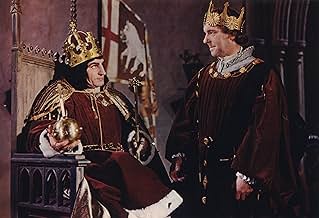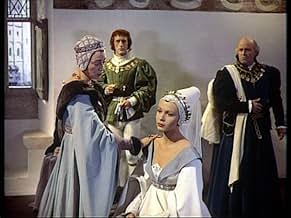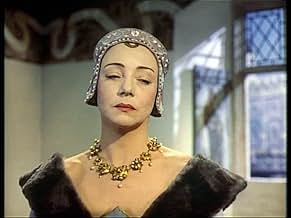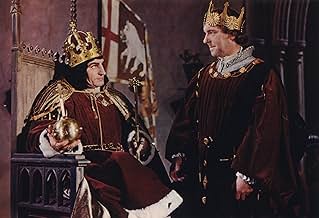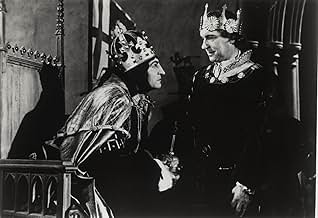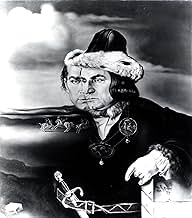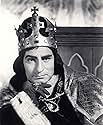IMDb रेटिंग
7.3/10
5.6 हज़ार
आपकी रेटिंग
अपनी भाषा में प्लॉट जोड़ेंA tale of the wicked deformed King and his conquests, both on the battlefield and in the boudoir.A tale of the wicked deformed King and his conquests, both on the battlefield and in the boudoir.A tale of the wicked deformed King and his conquests, both on the battlefield and in the boudoir.
- 1 ऑस्कर के लिए नामांकित
- 9 जीत और कुल 3 नामांकन
Wallace Bosco
- Monk
- (as Wally Bascoe)
फ़ीचर्ड समीक्षाएं
It may not be the best film of a Shakespeare play but surely there is no better Shakespearean performance on film than Laurence Olivier's "Richard III". He had already done "Henry V" and "Hamlet" on screen, winning Oscars for both, (an Honorary one for his "Henry V"), but 'Richard ...' was always considered the lesser, more fanciful play with an Elizabethan Godfather in charge yet Olivier made it his own, creating a Richard by which all others would be judged.
It's less 'cinematic' than either "Henry V" or "Hamlet", (the sets look like sets), but here 'the play's the thing' and Olivier cast it perfectly. Knights Gielgud and Hardwicke are quickly dispatched as Clarence and Edward but Ralph Richardson is a magnificently malevolent Buckingham, Mary Kerridge, a magnificent Queen Elizabeth and Claire Bloom, a sublime Lady Anne. It is also one of the most accessible of all Shakespeare adaptations; Shakespeare for those who don't like Shakespeare and a 'thriller' that genuinely thrills.
It's less 'cinematic' than either "Henry V" or "Hamlet", (the sets look like sets), but here 'the play's the thing' and Olivier cast it perfectly. Knights Gielgud and Hardwicke are quickly dispatched as Clarence and Edward but Ralph Richardson is a magnificently malevolent Buckingham, Mary Kerridge, a magnificent Queen Elizabeth and Claire Bloom, a sublime Lady Anne. It is also one of the most accessible of all Shakespeare adaptations; Shakespeare for those who don't like Shakespeare and a 'thriller' that genuinely thrills.
In many ways this is a stage-bound adaptation and with Olivier in the lead role this is not a bad thing. After all he was one of the theatre greats of the twentieth century.
In Richard III, Olivier constantly turns and talks to the audience with his devilish plans to ascend to the throne of England. Aided by his cousin the Duke of Buckingham (Ralph Richardson) he soon replaces King Edward IV (Cedric Hardwicke), rids himself of his other brother George (John Gielgud) and dispatches his young nephews to the tower and then brings their tender lives to a premature end.
The deformed, despicable hunchback even seduces the widow of a man he murdered for his own purposes, Lady Anne (Claire Bloom).
Once Richard ascends to the throne he finds that he has to do battle with a rival who also stakes a claim to the hollow crown.
This is a chance to see Olivier, still in his pomp speaking the Bard's verse. Unfortunately the accompanying music is too bombastic and Olivier's death scene verges on the ham.
In Richard III, Olivier constantly turns and talks to the audience with his devilish plans to ascend to the throne of England. Aided by his cousin the Duke of Buckingham (Ralph Richardson) he soon replaces King Edward IV (Cedric Hardwicke), rids himself of his other brother George (John Gielgud) and dispatches his young nephews to the tower and then brings their tender lives to a premature end.
The deformed, despicable hunchback even seduces the widow of a man he murdered for his own purposes, Lady Anne (Claire Bloom).
Once Richard ascends to the throne he finds that he has to do battle with a rival who also stakes a claim to the hollow crown.
This is a chance to see Olivier, still in his pomp speaking the Bard's verse. Unfortunately the accompanying music is too bombastic and Olivier's death scene verges on the ham.
Many great actors made their names with this Richard, and it turns out to be Olivier's greatest Shakepearean role as well. He captures the whole production coiling his way around the Crown of England: his asides to us through the camera are lovely. They say all actors love to play a villain. Well, it works for me.
The movie is beautiful, rich; the costumes are awesome; and the dialogue, of course, is wonderful. He patches in that great speech from Henry VI, part 3: "Why, I can smile, and murder whiles I smile . . .": and the movie wouldn't be right without it.
The other actors, Britain's elite of the time, seem to be tyrannized by the boss; and the text should have been edited better, because if you don't know the play and practically the whole history you'll get lost. Not to worry, though; the subplots here aren't really important (but they should be), and the thundering battle at the end will leave you satisfied. Special mention of Sir William Walton's music, the vibrant colors, and of course, England itself.
The movie is beautiful, rich; the costumes are awesome; and the dialogue, of course, is wonderful. He patches in that great speech from Henry VI, part 3: "Why, I can smile, and murder whiles I smile . . .": and the movie wouldn't be right without it.
The other actors, Britain's elite of the time, seem to be tyrannized by the boss; and the text should have been edited better, because if you don't know the play and practically the whole history you'll get lost. Not to worry, though; the subplots here aren't really important (but they should be), and the thundering battle at the end will leave you satisfied. Special mention of Sir William Walton's music, the vibrant colors, and of course, England itself.
This excellent production of "Richard III" features a terrific performance by Laurence Olivier in the lead role, plus a fine supporting cast, good color photography, and plenty of color and pageantry to set off the action. Richard III can be one of Shakespeare's most entertaining plays when it is done well, and this version does full justice to this classic play. It's especially enjoyable if you get the restored widescreen version.
Olivier is unsurpassed at performing Shakespeare, keeping the balance between giving life to his characters while making sure that they remain part of the play as a whole, rather than drawing all the attention to himself. This might be the best of all his screen Shakespearean roles, since Richard gives him so much to work with, and also because he has such an accomplished supporting cast to complement his own performance. Playing Richard gives him a chance to be charming, devious, tyrannical, and more, and the role offers some choice solo speeches plus other scenes that have excellent give-and-take with the other characters.
The rest of the cast also deserves praise. Ralph Richardson is ideally cast as Buckingham, a character who is so important both to the plot and also to showing us what Richard himself is all about. The rest of the cast includes good performances from Cedric Hardwicke, John Gielgud, Claire Bloom, and others. Olivier's adaptation/revision of the script also works pretty well, maintaining the feel of the play while often highlighting scenes that make for particularly good cinema. It all makes this just what a movie version of Shakespeare should be.
Olivier is unsurpassed at performing Shakespeare, keeping the balance between giving life to his characters while making sure that they remain part of the play as a whole, rather than drawing all the attention to himself. This might be the best of all his screen Shakespearean roles, since Richard gives him so much to work with, and also because he has such an accomplished supporting cast to complement his own performance. Playing Richard gives him a chance to be charming, devious, tyrannical, and more, and the role offers some choice solo speeches plus other scenes that have excellent give-and-take with the other characters.
The rest of the cast also deserves praise. Ralph Richardson is ideally cast as Buckingham, a character who is so important both to the plot and also to showing us what Richard himself is all about. The rest of the cast includes good performances from Cedric Hardwicke, John Gielgud, Claire Bloom, and others. Olivier's adaptation/revision of the script also works pretty well, maintaining the feel of the play while often highlighting scenes that make for particularly good cinema. It all makes this just what a movie version of Shakespeare should be.
It's quite a gap that Laurence Olivier covers between his portrayal of heroic Henry V and the evil Richard III. But he certainly does cover it well.
In fact this production boasts the talents of five knighted thespians in its cast, Olivier as Richard, John Gielgud as Clarence, Ralph Richardson as Buckingham, Cedric Hardwicke as Edward IV and Stanley Baker as the Earl of Richmond. That is probably some kind of record.
Once seen you will not forget the heavily made up Olivier with a shylock type nose and hunchbacked form. Unlike in Henry V and in Hamlet the title character's soliliquys are delivered straight to the audience rather than in voice-over. I think Olivier like Shakespeare wanted to emphasize the evilness of Richard as opposed to the tormenting doubts that Henry and Hamlet suffer. No doubts here, he's got his evil course well planned and he's very matter of factly telling his audience what's in store.
Of course when Shakespeare wrote this he was gearing up the Tudor dynasty propaganda machine. Stanley Baker's Earl of Richmond becomes Henry VII grandfather of the Queen whose patronage Shakespeare enjoyed. It was in Tudor family interest to blacken Richard's name to support their own dynastic claims. There have been several plausible theories put forth to claim the murders of Edward V and his brother were done by others.
One guy who in all the stories about Richard III who gets a whitewash is the Duke of Clarence. As portrayed by John Gielgud, Clarence is an innocent sacrificed in Richard's march for the throne. Actually Clarence was quite the schemer himself. He was in communication with Louis XI of France looking for aid in some plotting he was doing. Edward IV overlooked an incredible amount of treachery with him.
One very big flaw is that the film opens with Edward IV being restored to the throne again in 1471 and he has his son with him. Edward IV died in 1483 and the sons have not aged a mite. I believe they were 12 and 9 when they were put to death in the Tower of London in 1483. I'm surprised Olivier had that in his film.
Still and all it's a fabulous production and one should never miss a chance of seeing all that acting nobility in one film.
In fact this production boasts the talents of five knighted thespians in its cast, Olivier as Richard, John Gielgud as Clarence, Ralph Richardson as Buckingham, Cedric Hardwicke as Edward IV and Stanley Baker as the Earl of Richmond. That is probably some kind of record.
Once seen you will not forget the heavily made up Olivier with a shylock type nose and hunchbacked form. Unlike in Henry V and in Hamlet the title character's soliliquys are delivered straight to the audience rather than in voice-over. I think Olivier like Shakespeare wanted to emphasize the evilness of Richard as opposed to the tormenting doubts that Henry and Hamlet suffer. No doubts here, he's got his evil course well planned and he's very matter of factly telling his audience what's in store.
Of course when Shakespeare wrote this he was gearing up the Tudor dynasty propaganda machine. Stanley Baker's Earl of Richmond becomes Henry VII grandfather of the Queen whose patronage Shakespeare enjoyed. It was in Tudor family interest to blacken Richard's name to support their own dynastic claims. There have been several plausible theories put forth to claim the murders of Edward V and his brother were done by others.
One guy who in all the stories about Richard III who gets a whitewash is the Duke of Clarence. As portrayed by John Gielgud, Clarence is an innocent sacrificed in Richard's march for the throne. Actually Clarence was quite the schemer himself. He was in communication with Louis XI of France looking for aid in some plotting he was doing. Edward IV overlooked an incredible amount of treachery with him.
One very big flaw is that the film opens with Edward IV being restored to the throne again in 1471 and he has his son with him. Edward IV died in 1483 and the sons have not aged a mite. I believe they were 12 and 9 when they were put to death in the Tower of London in 1483. I'm surprised Olivier had that in his film.
Still and all it's a fabulous production and one should never miss a chance of seeing all that acting nobility in one film.
क्या आपको पता है
- ट्रिवियाMichael Gough got his part (Dighton, the first murderer) by making a fuss to his fellow actor friends about only established stars getting cameo parts and leaving nothing for struggling actors like him. One night he got a phone call, and a voice said "You've been stirring it, haven't you? Right little shit." Gough demanded to know, "Who is this?" only to be stunned by the response, "It's Larry", which of course was Sir Laurence Olivier. Olivier was just having some fun at Gough's expense, had taken on-board his criticisms and was ringing to offer him the part of one of the murderers in this movie. When asked which one he wanted to play, Gough quickly said "Whichever one has the most lines", and he got his wish. Olivier arranged matters so that Gough's scenes were split over several days, instead of all being done in one day, so that Gough would maximize his per diem fee.
- गूफ़In the scene when Richard tells King Edward of Clarence's supposed treason, two monks are singing hymns from a large book: their lips are not only out of sync with their singing, but with each other.
- भाव
Richard III: I'll drown more sailors than the mermaid shall,/ I'll play the orator as well as Nestor,/ Deceive more slyly than Ulysses could,/ And, like a Sinon, take another Troy./ I can add colours to the chameleon, /Change shapes with Proteus for advantages, /And set the murderous Machiavel to school./ Can I do this,and cannot get a crown?/Tut, were it farther off,/ I'll pluck it down.
- क्रेज़ी क्रेडिटMost of the film's credits are shown at the end. The opening credits show only the title of the film, William Shakespeare's name, and the names of the main actors.
- इसके अलावा अन्य वर्जनReleased in Great Britain at 155 minutes; some of the prints released in the USA are 139 minutes.
- कनेक्शनFeatured in Great Acting: Laurence Olivier (1966)
टॉप पसंद
रेटिंग देने के लिए साइन-इन करें और वैयक्तिकृत सुझावों के लिए वॉचलिस्ट करें
विवरण
- चलने की अवधि2 घंटे 41 मिनट
- रंग
इस पेज में योगदान दें
किसी बदलाव का सुझाव दें या अनुपलब्ध कॉन्टेंट जोड़ें



